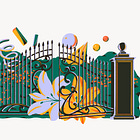Hardly a week passes that there isn’t grim news about the media industry—downsizings and mass layoffs, bankruptcies and closures. Much of the failure is tied to the decline of advertising, the crumbling foundation upon which most media has rested for a century. As ad sales dry up, budgets are slashed, and people are set adrift. This news is always painful to hear. We care about writers and their wellbeing, and we believe in the critical importance of a thriving media ecosystem in its many forms.
I work with writers on Substack, and several of them made the decision to go independent as a direct result of losing their job.
, for instance—who writes about labor, politics, and inequality—started How Things Work earlier this week after a long career at Gawker and a few other outlets.The majority of us [journalists] will float around like barnacles, resting for precious periods of stability before getting scraped off and sent floating once again, desperately freelancing and hoping the next resting place appears soon. We are, all of us, buffeted by big economic and technological and political forces almost completely out of our control, just like most other people, from the gas station to the classroom to the coal mine.
Hamilton is one of countless writers who’d searched for an alternative to the ad-driven, attention-fueled media structure and ultimately decided to work for himself and build his own business on Substack. “The ideal economic model for any writer is to be directly funded by readers. No investors, no advertisers, no bosses.”
recently launched after NPR laid him off, and he is self-funding his reporting on the ground in Ukraine through his Substack subscription revenue. and monetized , which had been a side project, when their decade-long career at the HuffPost came to an abrupt end during a round of layoffs. started On Montlake, a Substack about University of Washington sports, when The Athletic cut him loose without warning.Pulitzer-winning reporter
spent decades as a freelancer and staff writer in legacy media. He announced his move to Substack in February:Here, I have the kind of freedom I’ve always fought for. I’ve watched writer after writer on this platform as they’ve freed themselves from their publishers’ economic interests, run deep with stories without fear of word counts or column inches, and—most importantly—spoken directly to their readers. And that last point, for me, is the clincher. I’ve never been interested in socializing with pols or cozying up to money types at the self-important cocktail get togethers—the star-fucking parties, I always liked to call them. I’m at my best when I swig cheap bourbon with the servicemen, work over the first-year law firm associates for intel, or swap stories with the junior minister from a country most people can’t name. That’s always been my style. And as it turns out, it’s the ethos of this online community as well.
If you’re a writer who has been laid off or have had enough of the turbulence of ad-supported media, and you’re sorting through your options for what’s next, we’re here to help you explore independence. Send us an email at partnerships@substack.com. If you know a writer at a similar crossroads, please urge them to get in touch.
Here are resources to help you get started today:
Below are some testimonials by writers on Substack who have grappled with these same concerns:
of :of :Start a Substack. Best thing I ever did. No more living in fear that the next layoffs will hit you. No more dealing with terrible corporate people who have no idea what doing something creative for a living is like.
of :My Substack began as a way for me to break free of the tumultuous and layoff-prone world of media and to start something of my very own, complete with full editorial freedom. Since then, what began as a simple newsletter has grown into a full-fledged community of readers and fellow writers alike. Thanks to the company's ever-updating list of writer-focused products, I've connected with a much larger audience than I'd have otherwise been able to reach on my own.
of :Substack has changed my life. Full stop. I'm so grateful for its existence. No more screaming at editors to say, yes. No more waiting around until someone wants to publish my words. No more waiting to get paid or wondering how I'll pay rent this month.
of :My Substack has been up and running for an entire year now, and I am able to support myself on the revenue. This is huge. The financial freedom has afforded me a lot of editorial freedom - the most I have experienced in my two decades in journalism. It has been incredibly satisfying to be able to do the work that I most wanted to do. And I've had one of the most productive and successful years of my career. I also now have a community of readers that I'm in constant contact with. It's truly wonderful.
of :I've been a syndicated columnist, freelancer, successful blogger, and written 11 books over a 25 year writing career. But being on Substack and having a direct relationship with my readers has changed my life, approach to the craft of writing, and sense of vocation.
I've never been involved in any media project like Substack. In journalism, you struggle just to stay afloat. Something is changing in media and I'm fortunate to be part of it.








Share this post